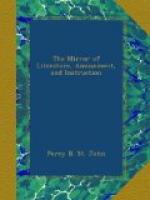then as ignorant as the laity; and as the wild work,
which in these sacred dramas is sometimes made of
the scripture history, may be supposed to have embodied
the knowledge of a whole fraternity, we may not unfairly
conjecture the kind of instruction to be obtained from
each individual. The state of language in Europe
must have greatly contributed to the adoption of public
instruction, by means of dramatic representation.
The services of the church were in Latin, now become
a dead language. This originated, perhaps,
rather in sincere reverence, and the dread of profaning
the sacred mysteries by transferring them into the
vulgar tongue, than in any systematic design of keeping
the people in the dark; for, from the gradual extinction
of the Latin, as the vernacular idiom, and the gradual
growth of the modern languages, there was no marked
period in which the change might appear to be called
for, until the question became involved with weightier
matters of controversy. The confusion of tongues,
almost throughout Europe, before the great predominant
languages were formed out of the conflicting dialects,
must greatly have impeded the preaching the Gospel,
for which, in other respects, only a very small part
of the clergy were qualified. Though, in these
times, most extraordinary effects are attributed to
the eloquence of certain preachers, for instance,
Fra. Giovanni di Vicenza, yet many of the itinerant
friars, the first, we believe, who addressed the people
with great activity in the vulgar tongue, must have
been much circumscribed by the limits of their own
patois.[1] But the spectacle of the dramatic exhibitions
everywhere spoke a common language; and the dialogue,
which, in parts of the Chester mysteries, is a kind
of Anglicized French, and which, even if translated
into the native tongue, was constantly interspersed
with Latin, and therefore, but darkly and imperfectly
understood, was greatly assisted by the perpetual
interpretation which was presented before the eyes.
The vulgar were thus imperceptibly wrought up to profound
feelings of reverence for the purity of the Virgin;
the unexampled sufferings of the Redeemer; the miraculous
powers of the apostles, and the constancy of the martyrs;
we must add, (for after all it was a strange Christianity,
though in every respect the Christianity of the age,)
with the most savage detestation at the cruelty of
Herod or Pilate, and the treachery of Judas; and the
most revolting horror, at the hideous appearance,
and blasphemous language of the Prince of Darkness,
who almost always played a principal part in these
scriptural dramas.—Quarterly Review.
[1] It is related in the life of St. Bernard, that
his pale and emaciated
appearance, and the animation
and the fire, which seemed to kindle his
whole being as he spoke, made
so deep an impression on those who could
only see him and hear his
voice, that Germans, who understand not a
word of his language, were
often moved to tears.—Neander, Der
Heilige Bernard, p. 49.




